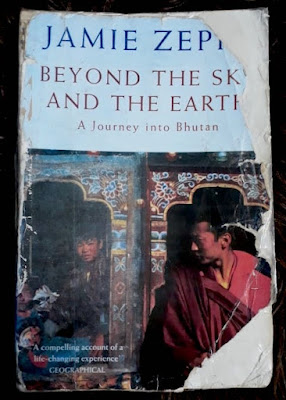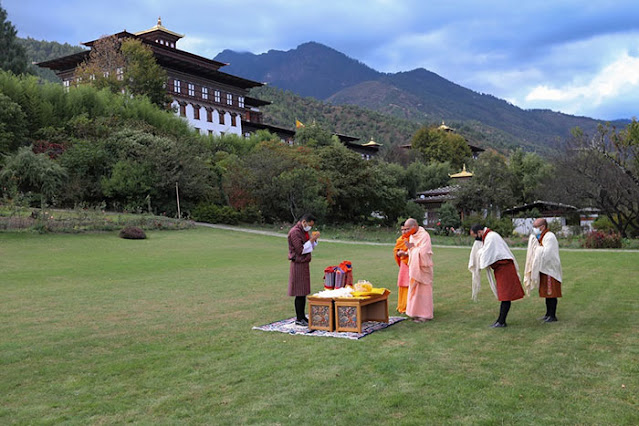I first read Beyond the Sky and the Earth: A Journey into Bhutan in 2008 soon after I had graduated from Sherubtse College. I faintly remember some fascinating moments of the book: Jamie riding on the ‘Vomit Comet’, Jamie teaching English in a remote school in Pema Gatshel, night hunting experience in Kanglung, and how Tshewang forgets his underwear in a bush where they have just made love.
I read the book again, this time particularly to know how a foreigner sees and understands Bhutan and the way of life here and what made her write this beautiful memoir. Moreover, just sometimes back, I met Mr Tshewang, the lover of Jamie, at the automobile workshop in Thimphu where I had a quick conversation with him.
Tshewang appears to me exactly what the author has described in the book: “He has a handsome face: high cheekbones, a luscious mouth” (pg. 244), “worldly and extremely well-read” (pg. 245), and “has a quicksilver smile and very mischievous eyes” (Pg. 245). The only difference, even after thirty years, is that he now has long grey hair and a wrinkled face.
“I came here to fix my alto car,” he told me in a jovial tone. “Tomorrow I will be traveling to eastern Bhutan to drop off a lama.”
Then we talked about his works and my writings. It’s quite a strange feeling to talk to someone that I read a great part of his life in a book.
Jamie Zeppa came to Bhutan in 1989 to teach through the World University Service of Canada, where she spent three and half years teaching English at Pema Gatshel Middle Secondary School and Sherubtse College. After that, she married Tshewang, with whom they have a son, Pema Dorji, and lived in Thimphu until 1998.
Jamie initially perceives Bhutan as a “remote”, secluded, “small Tantric Buddhist Kingdom in the Eastern Himalayas”, and mountainous with too difficult terrain. When she arrives in Bhutan, at the age of twenty-four, she seems lonely, certainly unhappy, regretful of her decision, and thoroughly tired and bitter. She has to go through endless difficulties living alone within an alien culture far from the security of her so-called ‘home’ in Canada (which she later starts calling Bhutan ‘home’ too).
However, this feeling gradually evaporates as she delves deeper into Bhutanese society, exploring the overwhelming beauty of Bhutan’s landscape, interacting with innocent crude people, knowing the warmth of Bhutanese culture, embracing faith and falling in love.
When Jamie reaches Sherubtse College, she has already fallen in love with Bhutan. She tells: “I have fallen into this world the way you fall into sleep, tumbling through layers of darkness into full dream. The way you fall in love.”
Over time, she finds solace and deep refuge in Buddhism, and she eventually converts to Buddhism and feels “Blessed to be here.”
She states that love with Tshewang is ‘a big reason’ why she has extended her stay in Bhutan. Had there been no entry of Tshewang into her life, this book would not be this exciting and enthralling.
This memoir is more than a usual travel book; it’s a love story. And her romance with Tshewang, which is supposed to be forbidden, is told in a brutally honest manner.
“He is a warm and ardent lover, completely uninhabited. It is as if we have been lovers for years…I am safe here, with him; in the middle of the biggest risk I have ever taken in my life, I am safe,” she says happily.
The book also provides astute assessments of outdated methods of teaching in schools, gender mainstreaming, the political situation of Bhutan, and the Bhutanese nature of just following directives and not being critical and vocal. But she says all this in an honest and humorous tone, which makes her observations very interesting and sensible.
Her book also takes me to many beautiful places in Bhutan that I have not been to yet: Jomolhari, a holy lake above Khaling, and Yurung in Pema Gatshel. I must say—among the books written on Bhutan that I read—Beyond the Sky and the Earth is the best. But I am a little disappointed with Jamie Zeppa because she has written only two books.
























